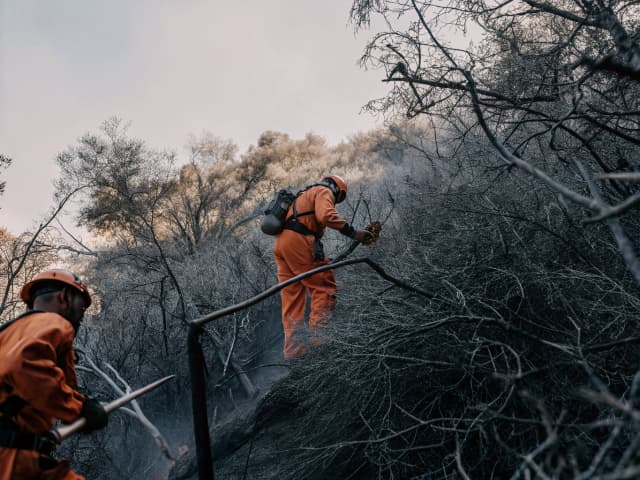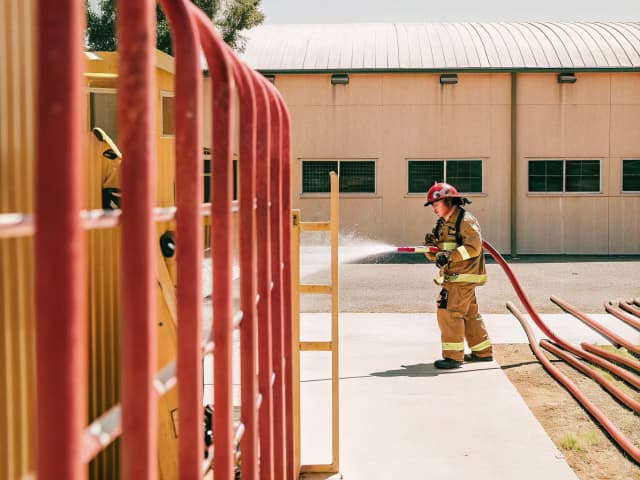Labor & Employment

Public works: prevailing wages: access to records.
Requires private owners to provide records to the DLSE, Taft-Hartley funds, and joint committees. Enumerates the records: bids, final contracts, contractor names, payrolls, and wage reports. Sets 30-day response, 10-day grace, and penalties: $100/day payroll; $500/day other. Deposits penalties into the State Public Works Enforcement Fund.
Public works: prevailing wages: access to records.

Requires private owners to provide records to the DLSE, Taft-Hartley funds, and joint committees. Enumerates the records: bids, final contracts, contractor names, payrolls, and wage reports. Sets 30-day response, 10-day grace, and penalties: $100/day payroll; $500/day other. Deposits penalties into the State Public Works Enforcement Fund.

Ports: truck drivers.
Establishes quarterly truck-entry data disclosure for Long Beach and LA. Mandates annual employee tax withholding affirmation and driver identification data. Public data release starts 2027; penalties for false data and 50% threshold updates.
Ports: truck drivers.

Establishes quarterly truck-entry data disclosure for Long Beach and LA. Mandates annual employee tax withholding affirmation and driver identification data. Public data release starts 2027; penalties for false data and 50% threshold updates.

Employment: Preapprenticeship Pathways to Employment Pilot Program.
Creates a temporary preapprenticeship pilot for incarcerated individuals. Uses MC3-based training and awards certification on completion. Requires at least one men’s facility and one women’s facility by January 1, 2028 with equitable access. Provides wraparound services and annual reporting to the Legislature starting 2029; sunsets 2032.
Employment: Preapprenticeship Pathways to Employment Pilot Program.

Creates a temporary preapprenticeship pilot for incarcerated individuals. Uses MC3-based training and awards certification on completion. Requires at least one men’s facility and one women’s facility by January 1, 2028 with equitable access. Provides wraparound services and annual reporting to the Legislature starting 2029; sunsets 2032.

Workers’ compensation.
Imposes a cap on the employer’s third-party recovery for peace officers and firefighters. The cap is one-third of the third-party policy limits when damages exceed net recovery. Applies to peace officers and firefighters employed by specified local entities like cities and counties. Requires settlements to reflect the allocation and bars credits against future workers’ compensation benefits.
Workers’ compensation.

Imposes a cap on the employer’s third-party recovery for peace officers and firefighters. The cap is one-third of the third-party policy limits when damages exceed net recovery. Applies to peace officers and firefighters employed by specified local entities like cities and counties. Requires settlements to reflect the allocation and bars credits against future workers’ compensation benefits.

Food vendors and facilities: enforcement activities.
Mandates privacy protections for sidewalk vendors and compact mobile food operations. Prohibits immigration-enforcement inquiries in permit processes and restricts record disclosures. Destruction deadlines require deleting pre-2026 birth and criminal-history data by March 1, 2026. Accepts non-SSN identifiers for permits and keeps PII CPRA-exempt from disclosure.
Food vendors and facilities: enforcement activities.

Mandates privacy protections for sidewalk vendors and compact mobile food operations. Prohibits immigration-enforcement inquiries in permit processes and restricts record disclosures. Destruction deadlines require deleting pre-2026 birth and criminal-history data by March 1, 2026. Accepts non-SSN identifiers for permits and keeps PII CPRA-exempt from disclosure.

The Workplace Know Your Rights Act.
Establishes the Workplace Know Your Rights Act to inform workers about protections. Requires annual notices to current workers and new hires by Feb 1, 2026. Directs template notice and rights videos; sets emergency contact deadline. Imposes penalties up to 500 per employee per violation and 500 per day for emergency contact violations.
The Workplace Know Your Rights Act.

Establishes the Workplace Know Your Rights Act to inform workers about protections. Requires annual notices to current workers and new hires by Feb 1, 2026. Directs template notice and rights videos; sets emergency contact deadline. Imposes penalties up to 500 per employee per violation and 500 per day for emergency contact violations.

Prevailing wage: per diem wages.
Revokes director exemptions on annualization to standardize fringe-benefit credits. Allows full credit for defined contribution pensions with vesting within 500 hours on public works. Requires employers to prove credit calculations and provide records upon request. Requires CBAs to be filed with DIR 30 days before bid calls and may influence wage determinations.
Prevailing wage: per diem wages.

Revokes director exemptions on annualization to standardize fringe-benefit credits. Allows full credit for defined contribution pensions with vesting within 500 hours on public works. Requires employers to prove credit calculations and provide records upon request. Requires CBAs to be filed with DIR 30 days before bid calls and may influence wage determinations.

Employees and independent contractors: construction trucking.
Establishes a time-limited amnesty for misclassification penalties if drivers are reclassified. Requires applications and settlements by January 1, 2029. Clarifies that vehicle ownership does not automatically make a worker an independent contractor. Allows enforcement actions if a contractor fails to comply with the settlement.
Employees and independent contractors: construction trucking.

Establishes a time-limited amnesty for misclassification penalties if drivers are reclassified. Requires applications and settlements by January 1, 2029. Clarifies that vehicle ownership does not automatically make a worker an independent contractor. Allows enforcement actions if a contractor fails to comply with the settlement.

Employment: automated decision systems.
Mandates pre-use notices and an updated ADS inventory. Requires applicants to be notified when ADS affects hiring decisions. Gives workers the right to access 12 months of ADS data used for discipline decisions. Imposes $500 penalties and enforcement; requires human review when ADS drives discipline.
Employment: automated decision systems.

Mandates pre-use notices and an updated ADS inventory. Requires applicants to be notified when ADS affects hiring decisions. Gives workers the right to access 12 months of ADS data used for discipline decisions. Imposes $500 penalties and enforcement; requires human review when ADS drives discipline.

Prisons: death benefit for incarcerated firefighters.
Establishes a death-benefit for state prison hand crew members in the Conservation Camp program. Pays $50,000 plus 50% of the deceased's prior-year wages. Paid within 60 days to the designated beneficiary when death occurs during deployment or training. Overrides a Labor Code limit and requires fiscal review with no explicit appropriation.
Prisons: death benefit for incarcerated firefighters.

Establishes a death-benefit for state prison hand crew members in the Conservation Camp program. Pays $50,000 plus 50% of the deceased's prior-year wages. Paid within 60 days to the designated beneficiary when death occurs during deployment or training. Overrides a Labor Code limit and requires fiscal review with no explicit appropriation.

Workers’ compensation: qualified medical evaluators.
Adds a new labor code provision to standardize QME forms. Requires the administrator to develop a template QME report form. Requires a medical evaluation request form for communications with QMEs. Mandates regulatory adoption by 2027 under APA, with no appropriation.
Workers’ compensation: qualified medical evaluators.

Adds a new labor code provision to standardize QME forms. Requires the administrator to develop a template QME report form. Requires a medical evaluation request form for communications with QMEs. Mandates regulatory adoption by 2027 under APA, with no appropriation.

Public transportation providers.
Expands battery crimes to protect transit operators, passengers, and employees or contractors. Extends restraining order remedies to transit battery and broadens employer scope. Takes effect January 1, 2025; no reimbursement; forms and enforcement by Judicial Council.
Public transportation providers.

Expands battery crimes to protect transit operators, passengers, and employees or contractors. Extends restraining order remedies to transit battery and broadens employer scope. Takes effect January 1, 2025; no reimbursement; forms and enforcement by Judicial Council.

Labor: elective compensation under the Inflation Reduction Act of 2022.
Authorizes voluntary retroactive wage payments to clean energy workers to boost IRA incentives. Limited to renewable projects started in 2023 and completed by 2024. Excludes retaliation, misclassification, and unrelated violations from coverage. Enacts immediate effect with Labor Commissioner enforcement and a 2029 sunset.
Labor: elective compensation under the Inflation Reduction Act of 2022.

Authorizes voluntary retroactive wage payments to clean energy workers to boost IRA incentives. Limited to renewable projects started in 2023 and completed by 2024. Excludes retaliation, misclassification, and unrelated violations from coverage. Enacts immediate effect with Labor Commissioner enforcement and a 2029 sunset.

Firefighters: personal protective equipment.
Requires updating PPE safety orders to curb PFAS and align with NFPA standards. Mandates modifying PPE rules by January 1, 2028 to remove hazardous substances and NFPA as floor. Manufacturers must certify PPE meets new California standards and is PFAS-free. Implements staged rollout; 10-year phase-out; DOSH report by 2026; sunset 2030.
Firefighters: personal protective equipment.

Requires updating PPE safety orders to curb PFAS and align with NFPA standards. Mandates modifying PPE rules by January 1, 2028 to remove hazardous substances and NFPA as floor. Manufacturers must certify PPE meets new California standards and is PFAS-free. Implements staged rollout; 10-year phase-out; DOSH report by 2026; sunset 2030.

Employment: rehiring and retention: displaced workers.
Extends the recall framework to January 1, 2027. Broadens coverage to hotels, airports, airport services, event centers, and private clubs. Maintains five-day recall offers and five-day acceptance with length-of-service preference. Preserves DLSE enforcement with front pay, back pay, penalties, and no criminal penalties.
Employment: rehiring and retention: displaced workers.

Extends the recall framework to January 1, 2027. Broadens coverage to hotels, airports, airport services, event centers, and private clubs. Maintains five-day recall offers and five-day acceptance with length-of-service preference. Preserves DLSE enforcement with front pay, back pay, penalties, and no criminal penalties.

Workforce development: the Counties of Los Angeles and Ventura: 2025 wildfires.
Mandates wildfire recovery workforce funding for LA and Ventura. Directs CWDB to route 2025 funds to LA County for rebuilding jobs. Reallocates $600,000 to the Economic Development Collaborative and allows subcontracting. Permits up to 5% admin, requires quality standards, and enables expedited licensing where feasible.
Workforce development: the Counties of Los Angeles and Ventura: 2025 wildfires.

Mandates wildfire recovery workforce funding for LA and Ventura. Directs CWDB to route 2025 funds to LA County for rebuilding jobs. Reallocates $600,000 to the Economic Development Collaborative and allows subcontracting. Permits up to 5% admin, requires quality standards, and enables expedited licensing where feasible.

Employment: unlawful discrimination: victims of violence.
Restores former leave protections through 2024 and shifts enforcement to civil rights. Expands leave rights for crime victims and families, including court proceedings and safety steps. Creates new paid sick days framework with specific triggers and confidentiality rules. Directs immediate effect as an urgency statute for rapid implementation.
Employment: unlawful discrimination: victims of violence.

Restores former leave protections through 2024 and shifts enforcement to civil rights. Expands leave rights for crime victims and families, including court proceedings and safety steps. Creates new paid sick days framework with specific triggers and confidentiality rules. Directs immediate effect as an urgency statute for rapid implementation.

Incarcerated individual hand crew members: wages.
Requires the $7.25 hourly wage for inmate hand crews on active fires and sets annual review. Amends credits to two days per day and adds wage dispute rules for sums owed. Extends wage to Pine Grove ward or youth hand crews, with annual review and dispute processes. Declares the measure an urgency statute with immediate effect for wildfire readiness.
Incarcerated individual hand crew members: wages.

Requires the $7.25 hourly wage for inmate hand crews on active fires and sets annual review. Amends credits to two days per day and adds wage dispute rules for sums owed. Extends wage to Pine Grove ward or youth hand crews, with annual review and dispute processes. Declares the measure an urgency statute with immediate effect for wildfire readiness.

Workers’ compensation: death benefits.
Raises the minor dependent health-benefits age to 26 for specified local workers. Adds Orange County Sheriff’s Special Officers to the covered group. Maintains lump-sum survivor option and spousal-coverage restriction. Adds retroactive coverage for pre-1996 deaths with local-cost implications.
Workers’ compensation: death benefits.

Raises the minor dependent health-benefits age to 26 for specified local workers. Adds Orange County Sheriff’s Special Officers to the covered group. Maintains lump-sum survivor option and spousal-coverage restriction. Adds retroactive coverage for pre-1996 deaths with local-cost implications.

Employment: contracts in restraint of trade.
Prohibits certain post-2026 employment contract terms that charge workers after termination. Creates private enforcement with damages, injunctive relief, and attorney's fees. Carves out government loan relief, tuition contracts, apprenticeships, upfront pay. Defines key terms to determine scope, including contract, debt, employer, and worker.
Employment: contracts in restraint of trade.

Prohibits certain post-2026 employment contract terms that charge workers after termination. Creates private enforcement with damages, injunctive relief, and attorney's fees. Carves out government loan relief, tuition contracts, apprenticeships, upfront pay. Defines key terms to determine scope, including contract, debt, employer, and worker.

Employment: immigration and work authorization.
Establishes time-limited protections for work authorization. Grants up to five unpaid leave days per year for immigration-related matters. Provides reinstatement after work-authorization delays. Enforces the provisions and preserves CBA/MOU seniority and detainment leave.
Employment: immigration and work authorization.

Establishes time-limited protections for work authorization. Grants up to five unpaid leave days per year for immigration-related matters. Provides reinstatement after work-authorization delays. Enforces the provisions and preserves CBA/MOU seniority and detainment leave.

Public employees’ retirement.
Empowers the Teachers’ Retirement Board to determine an employer and membership for STRS. Sets a board-determined implementation date for annualized pay rate changes by July 1, 2027. Aligns Oct 15 and Apr 15 transfers and quarterly payments to next business day if weekend/holiday. Expands overpayment recovery to multiple parties with interest.
Public employees’ retirement.

Empowers the Teachers’ Retirement Board to determine an employer and membership for STRS. Sets a board-determined implementation date for annualized pay rate changes by July 1, 2027. Aligns Oct 15 and Apr 15 transfers and quarterly payments to next business day if weekend/holiday. Expands overpayment recovery to multiple parties with interest.

California Workplace Outreach Program.
Establishes the California Workplace Outreach Program to boost protections awareness. Requires competitive procurement for qualified nonprofit education partners. Requires materials translated and collaboration with the Civil Rights Department. Sunsets the program on January 1, 2031, unless extended by law.
California Workplace Outreach Program.

Establishes the California Workplace Outreach Program to boost protections awareness. Requires competitive procurement for qualified nonprofit education partners. Requires materials translated and collaboration with the Civil Rights Department. Sunsets the program on January 1, 2031, unless extended by law.

Farmworkers: benefits.
Establishes a disputable heat injury presumption for outdoor farmworkers when heat standards are not met. Decides the presumption, and the employee wins if the employer cannot rebut it. Provides medical treatment and disability benefits for heat injuries. Creates a $5M seed fund and payroll surcharges to finance the program, ending in 2031.
Farmworkers: benefits.

Establishes a disputable heat injury presumption for outdoor farmworkers when heat standards are not met. Decides the presumption, and the employee wins if the employer cannot rebut it. Provides medical treatment and disability benefits for heat injuries. Creates a $5M seed fund and payroll surcharges to finance the program, ending in 2031.

Public works: payroll records.
Establishes awarding bodies must obtain payroll records not in possession and provide them on request. Sets a 10-day deadline to supply records and enables DLSE enforcement and cost recovery. Imposes $100 per day per worker penalties and allows withholding from progress payments. Redacts personal data in public copies while contractor details stay visible.
Public works: payroll records.

Establishes awarding bodies must obtain payroll records not in possession and provide them on request. Sets a 10-day deadline to supply records and enables DLSE enforcement and cost recovery. Imposes $100 per day per worker penalties and allows withholding from progress payments. Redacts personal data in public copies while contractor details stay visible.